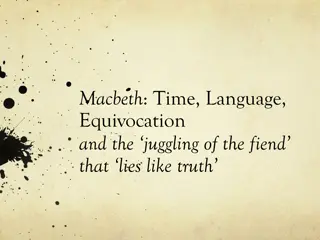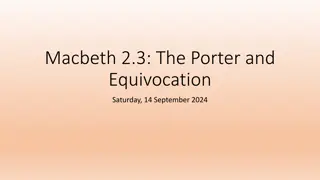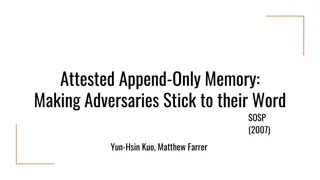Analysis of Time, Language, and Equivocation in Macbeth
The play Macbeth explores intricate themes of time, language, and equivocation through vivid characters and dramatic dialogue. The protagonist, Macbeth, grapples with moral dilemmas, as seen in key scenes like Lady Macbeth's infamous hand-washing. The witches' cryptic statement, "Fair is foul, and f
0 views • 12 slides
Macbeth: The Porter, Equivocation, and Stand-up Comedy
Exploring the themes of equivocation and comedy in Shakespeare's Macbeth, this content covers the significance of the Porter scene, historical context related to Guy Fawkes and equivocation, and how comedy is intertwined with serious themes in the play. Equivocation, lying under oath, and Catholic a
0 views • 13 slides
TrInc: Small Trusted Hardware for Large Distributed Systems
TrInc is a system designed to provide trusted hardware for large distributed systems, aiming to prevent equivocation, ensure trust in distributed systems, and enhance security through various applications and features. Developed by Jacob R. Lorch and team, TrInc offers solutions such as BFT with few
0 views • 62 slides
Secure Append-Only Memory for Byzantine Fault Tolerance
Explore the concept of Attested Append-Only Memory (A2M) in distributed systems, which ensures adversaries adhere to their commitments. Learn about safety and liveness goals, Practical Byzantine Fault Tolerance (PBFT), equivocation issues, and the A2M log and interface for secure data management. Di
0 views • 34 slides



